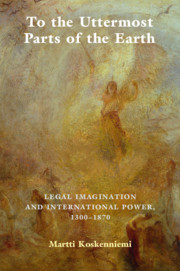CUP is publishing ‘To the
Uttermost Parts of the Earth: Legal Imagination and International Power
1300–1870’
ABOUT THE BOOK
To the Uttermost Parts of the
Earth shows the vital role played by legal imagination in the formation of
the international order during 1300–1870. It discusses how European statehood
arose during early modernity as a locally specific combination of ideas about
sovereign power and property rights, and how those ideas expanded to structure
the formation of European empires and consolidate modern international
relations. By connecting the development of legal thinking with the history of
political thought and by showing the gradual rise of economic analysis into
predominance, the author argues that legal ideas from different European legal
systems - Spanish, French, English and German - have played a prominent role in
the history of global power. This history has emerged in imaginative ways to
combine public and private power, sovereignty and property. The book will
appeal to readers crossing conventional limits between international law,
international relations, history of political thought, jurisprudence and legal
history.
ABOUT THE AUTHOR
Martti Koskenniemi, University
of Helsinki
Martti Koskenniemi is Professor
of International Law at the University of Helsinki. His works on the theory and
history of international law are studied by lawyers, historians and
international relations scholars across the world. He has held visiting
professorships at many leading universities and he is Corresponding Fellow of
the British Academy and a Member of the American Academy of Arts and Sciences.
TABLE OF CONTENTS
Introduction
1. Legal Imagination in a
Christian World – Ruling France, c. 1300
2. The Political Philosophy of
jus gentium – the Expansion of Spain, 1524–1559
3. Italian Lessons – ius gentium
and Reason of States
4. The Rule of Law – Grotius
5. Governing Sovereignty –
Negotiating French 'Absolutism' in Europe, 1625–1715
6. Reason, Resolution,
Restoration – European Public Law, 1715–1804
7. Colonies, Companies, Slaves –
French dominium in the World, 1627–1804
8. The Law and Economics of
State-Building – England, c. 1450–c. 1650
9. 'Giving Law to the World –
England, c. 1635–c. 1830
10. Global Law – Ruling the
British Empire
11. A Science of State-Machines –
ius naturae et gentium as a German Discipline, 1500–1758
12. The End of Natural Law –
German Freedom, 1734–1821
Epilogue.
More info here


No comments:
Post a Comment
Note: Only a member of this blog may post a comment.